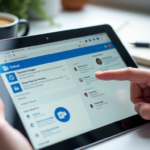
Podcasting has transcended mere entertainment, evolving into a potent tool for marketers seeking to build authority, establish connections, and engage audiences in ways never before imagined. In a world where consumers are inundated with content, podcasts offer a unique medium that is intimate and personal. If you’re considering starting a marketing podcast, you’re about to embark on a rewarding journey. Not only can this medium help elevate your brand, but it can also position you as an expert in your field. The multifaceted nature of podcasts means you can weave storytelling, interviews, and education into a cohesive narrative that captivates listeners.
To ensure your podcast resonates, a deep understanding of the basics of podcasting is critical. This isn’t simply about recording your voice and hitting publish. Rather, it encompasses understanding your audience, creating engaging content, and effectively marketing your show. With careful planning and execution, your podcast could become a cornerstone of your marketing strategy, providing immense value to your listeners. Let’s delve into the essentials of starting your very own marketing podcast.
Understanding the Basics of Podcasting

Podcasting has exploded in popularity over the past few years, making it an essential marketing tool. Learning the basic concepts of podcasting is critical to launching a successful show. One of the primary reasons people tune into podcasts is their ability to hear insights, stories, and experiences from hosts they admire. This creates an opportunity for brands to foster relationships with their target audiences. When you produce quality content consistently, you build trust and credibility, which can have lasting impacts on your audience through brand loyalty.
Podcasting allows businesses to connect with audiences in a personal way. Unlike other forms of content, audio can be consumed on-the-go, making it appealing to listeners. Furthermore, podcasts create an opportunity for deep engagement since they typically feature longer content lengths, giving your audience more time to connect with your message. Studies show that podcast listeners are incredibly loyal, often returning for each new episode. This loyalty can translate into increased shares, leads, and conversions for your brand.
Defining Your Niche and Target Audience

Before diving into the technical side of podcast creation, it’s essential to identify your niche and target audience. Launching a podcast without a clear understanding of these elements can lead to confusion and disengagement. Finding a specific topic or theme that distinguishes your podcast from others is crucial, as it enables you to focus your content and attract the right listeners. Your niche should reflect your expertise while being relevant to audience interests.
Identifying Your Niche
Finding your niche involves examining your passions and professional knowledge. You might consider the following when determining your niche:
- Your industry experience
- Topics you are passionate about
- Market gaps or emerging trends
- Feedback from potential listeners
| Niche Idea | Audience Interest | Content Type |
|---|---|---|
| Digital Marketing Trends | Marketers, business owners | Interviews, roundtable discussions |
| Social Media Strategies | Social media managers | Tutorials, case studies |
| Content Creation Tips | Content creators, bloggers | How-tos, storytelling |
Understanding Your Audience
Defining your target audience helps shape your content, marketing strategy, and promotional efforts. Consider demographics like age, gender, geographic location, and common pain points. This understanding will guide you in creating content that addresses their specific needs. Try to create listener personas that encapsulate the interests and preferences of your ideal audience. Developing such personas will ensure that your podcast content resonates deeply with your listeners.
Crafting Engaging Content
Creating engaging content is the cornerstone of a successful podcast. Quality content keeps your audience coming back for more and helps to establish a loyal following. A well-crafted episode that provides real value can transform casual listeners into advocates who share your show with others. Developing a content plan is essential for maintaining consistency and freshness in your episodes.
Your content plan should outline potential topics for future episodes, guest appearances, and engaging segments. Taking the time to create a structured plan can help you stay organized and focused. Here’s a checklist to consider:
- Brainstorm episode topics
- Plan guest interview schedules
- Craft episode outlines
- Develop promotional strategies for each episode
Technical Setup for Your Podcast
Once you have your content plan, the next step involves the technical aspects of podcasting. Selecting the right equipment and software is crucial for ensuring quality audio. Good audio quality can greatly influence your listeners’ experience, and poor sound can lead them to disengage from your show. Invest in quality microphones, headphones, and audio recording/editing software to produce professional-sounding episodes.
Below is a list of equipment you’ll need to get started:
- USB or XLR microphone
- Pop filter for clear sound
- Headphones for monitoring
- Audio recording software (like Audacity or GarageBand)
- Podcast hosting service
Promotion and Marketing Strategies
Marketing your podcast effectively can significantly increase your listener base. Consider various strategies to promote your show, as simply publishing episodes isn’t enough to attract an audience. Each episode can serve as a marketing tool for your overall brand. Leverage your existing networks and digital channels to spread the word.
Social media platforms are powerful tools to engage with your audience and share new episodes. Create shareable content around your episodes, including quotes, behind-the-scenes photos, and engaging visuals. Use the following strategies:
- Post episode teasers and clips
- Involve listeners by asking questions or opinions
- Create a dedicated hashtag to build community
- Collaborate with influencers or industry experts for wider reach
Conclusion
Starting a marketing podcast can be challenging yet immensely rewarding. By focusing on your niche, creating engaging content, mastering the technical setup, and executing effective marketing strategies, you’re well on your way to establishing a successful podcast. Remember, it’s about connecting with your audience and providing them with value consistently. The journey may require time and dedication, but with persistence, you can craft a show that transforms your marketing efforts.
Frequently Asked Questions
- What equipment do I need to start a podcast? You need a good quality microphone, headphones, and audio recording/editing software. A hosting platform is also essential.
- How long should each podcast episode be? The ideal length varies depending on your audience, but most successful podcasts range from 20 to 60 minutes.
- How often should I release new episodes? Regularity is key; consider releasing episodes weekly, bi-weekly, or monthly based on your content plan and audience expectations.
- Can I monetize my podcast? Yes, you can monetize through sponsorships, listener donations, and merchandise once you have a steady listener base.
- Do I need to be an expert to start a podcast? While having expertise in your niche can be beneficial, passion and willingness to learn can also lead to a successful podcast.




